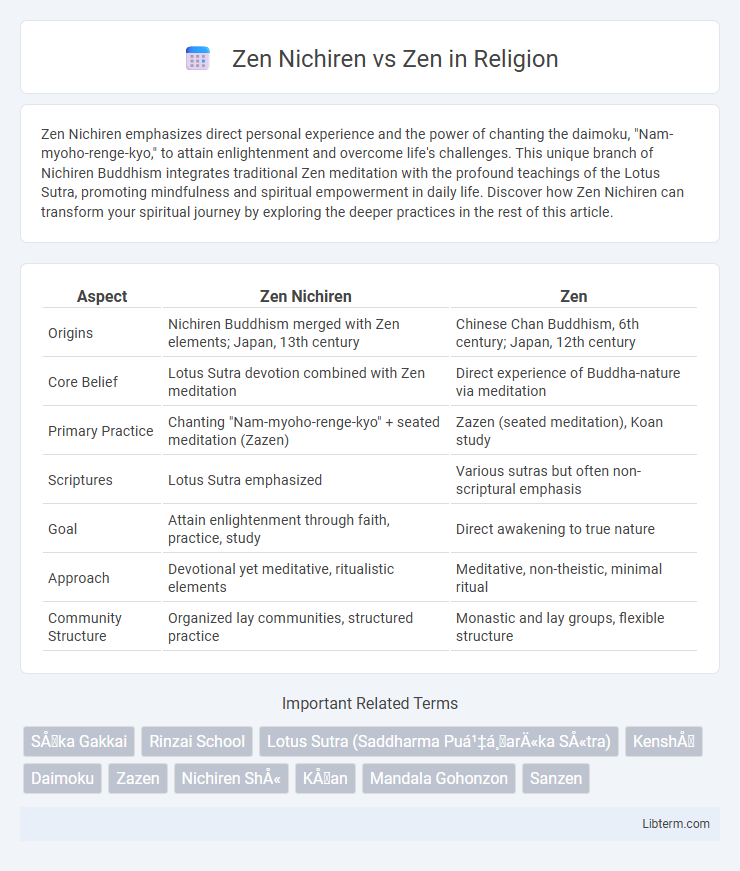Zen Nichiren emphasizes direct personal experience and the power of chanting the daimoku, "Nam-myoho-renge-kyo," to attain enlightenment and overcome life's challenges. This unique branch of Nichiren Buddhism integrates traditional Zen meditation with the profound teachings of the Lotus Sutra, promoting mindfulness and spiritual empowerment in daily life. Discover how Zen Nichiren can transform your spiritual journey by exploring the deeper practices in the rest of this article.
Table of Comparison
| Aspect | Zen Nichiren | Zen |
|---|---|---|
| Origins | Nichiren Buddhism merged with Zen elements; Japan, 13th century | Chinese Chan Buddhism, 6th century; Japan, 12th century |
| Core Belief | Lotus Sutra devotion combined with Zen meditation | Direct experience of Buddha-nature via meditation |
| Primary Practice | Chanting "Nam-myoho-renge-kyo" + seated meditation (Zazen) | Zazen (seated meditation), Koan study |
| Scriptures | Lotus Sutra emphasized | Various sutras but often non-scriptural emphasis |
| Goal | Attain enlightenment through faith, practice, study | Direct awakening to true nature |
| Approach | Devotional yet meditative, ritualistic elements | Meditative, non-theistic, minimal ritual |
| Community Structure | Organized lay communities, structured practice | Monastic and lay groups, flexible structure |
Introduction to Zen Nichiren and Zen Buddhism
Zen Nichiren Buddhism emphasizes the Lotus Sutra as the ultimate teaching, advocating the chanting of "Nam-myoho-renge-kyo" for enlightenment and societal transformation. Zen Buddhism centers on meditation (zazen) and direct insight into one's true nature, often through koans and monastic discipline. Both practices originate from Mahayana Buddhism but differ in focus: Zen prioritizes experiential wisdom, while Nichiren emphasizes devotional practice and faith in the sutra's power.
Historical Origins: Zen Nichiren vs Traditional Zen
Zen Nichiren originated in 13th-century Japan, founded by Nichiren Daishonin, emphasizing the Lotus Sutra as the ultimate teaching, differentiating it from Traditional Zen, which traces back to Indian Mahayana Buddhism and evolved through Chinese Chan. Traditional Zen stresses meditation (zazen) and direct realization of Buddha-nature, while Zen Nichiren centers on chanting Nam-myoho-renge-kyo as a means to enlightenment. These distinct historical origins influence their doctrinal focus, practice methods, and philosophical interpretations within the broader Buddhist tradition.
Core Beliefs and Doctrines
Zen Nichiren centers on the Lotus Sutra as the ultimate teaching, emphasizing faith in the chanting of "Nam-myoho-renge-kyo" for enlightenment and world peace, distinguishing it from traditional Zen. Zen Buddhism prioritizes direct experience and meditation (zazen) to achieve satori or sudden awakening, focusing on the nature of mind and reality beyond scriptures. Nichiren's doctrine advocates active engagement in societal transformation through faith, while Zen often stresses personal insight and non-attachment to doctrine.
Key Practices: Chanting versus Meditation
Zen Nichiren Buddhism emphasizes chanting the mantra "Nam-myoho-renge-kyo" as a key practice to invoke the Buddha's wisdom and transform suffering. Zen Buddhism primarily focuses on seated meditation (zazen) to cultivate mindfulness and insight into the nature of existence. Both traditions aim for enlightenment but use chanting and meditation respectively to deepen spiritual realization and personal transformation.
Spiritual Goals and Enlightenment
Zen Nichiren centers on the devotion to the Lotus Sutra as the ultimate path to enlightenment, emphasizing chanting "Nam-myoho-renge-kyo" to attain Buddhahood and transform suffering. Traditional Zen prioritizes direct experience of one's true nature through meditation (zazen) and mindfulness to achieve sudden enlightenment (satori) beyond conceptual thinking. While Zen Nichiren integrates ritualistic faith and recitation for spiritual empowerment, Zen focuses on silent introspection and immediate realization of non-duality as the core spiritual goal.
Major Texts and Scriptures
Zen Nichiren Buddhism centers its teachings on the Lotus Sutra as the ultimate scripture, emphasizing faith in the daimoku chant, "Nam-myoho-renge-kyo," for enlightenment. In contrast, traditional Zen prioritizes meditation practices and looks to texts like the Platform Sutra of Huineng and various koan collections such as the Blue Cliff Record for guidance. The distinctive scriptural focus in Zen Nichiren underpins its devotional practice, whereas Zen emphasizes direct realization beyond textual study.
Role of Teachers and Community
The role of teachers in Zen Nichiren emphasizes the transmission of the Lotus Sutra's teachings directly from master to disciple, fostering a strong sense of lineage and personal guidance within a communal practice setting. In contrast, traditional Zen prioritizes direct experience and meditation under a teacher's guidance, often highlighting koan study and face-to-face interaction to awaken insight. Both traditions value community, but Zen Nichiren centers community practice around chanting and shared faith in the Lotus Sutra, while Zen communal life focuses on meditation sessions and monastic discipline.
Daily Life and Rituals
Zen Nichiren practice emphasizes chanting the mantra "Nam-myoho-renge-kyo" daily to harness inner peace and life transformation, reinforcing personal empowerment through ritual. Zen Buddhism centers on zazen meditation, focusing on mindful breathing and posture to cultivate presence and awareness in everyday activities. Both traditions integrate their distinctive rituals into daily life, shaping habitual practices that foster spiritual clarity and mental discipline.
Criticisms and Misconceptions
Zen Nichiren Buddhism faces criticism for its exclusive emphasis on the Lotus Sutra, which some argue narrows the broader Zen focus on direct meditation experience and non-attachment. Critics often misunderstand Zen Nichiren's dynamic chanting practice as dogmatic rather than a form of profound spiritual discipline. Misconceptions also arise around Zen's perceived detachment being interpreted as emotional coldness, whereas Zen Nichiren emphasizes active engagement with suffering through faith and prayer.
Choosing Between Zen Nichiren and Zen
Choosing between Zen Nichiren and Zen depends on individual spiritual goals and practice preferences. Zen Nichiren emphasizes chanting the daimoku (Nam-myoho-renge-kyo) to invoke the Lotus Sutra's enlightenment, while traditional Zen focuses on meditation (zazen) to attain direct insight into one's true nature. Understanding the doctrinal emphasis and ritual practices helps in selecting the path that aligns with personal faith and lifestyle.
Zen Nichiren Infographic

 libterm.com
libterm.com